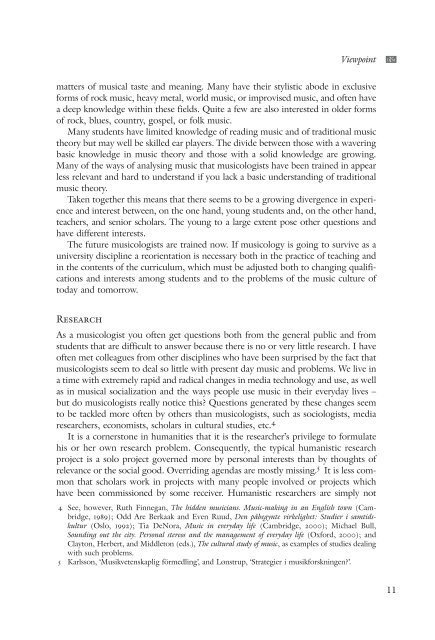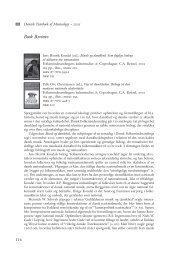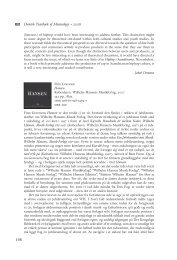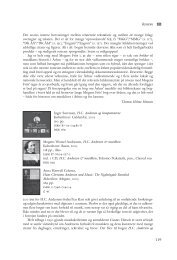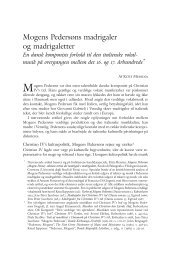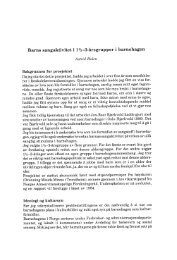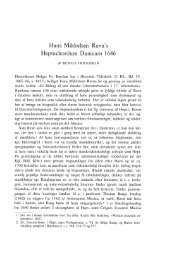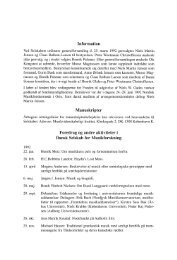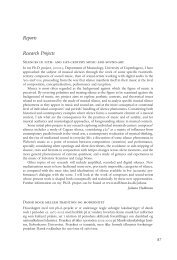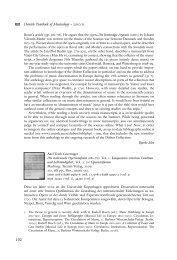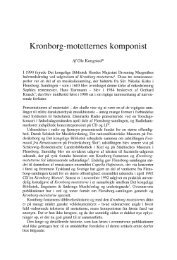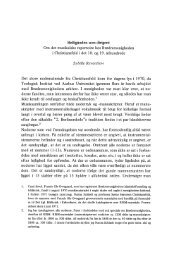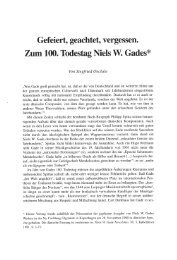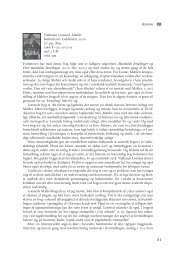Danish Yearbook of Musicology 33 ⢠2005 / Dansk årbog ... - dym.dk
Danish Yearbook of Musicology 33 ⢠2005 / Dansk årbog ... - dym.dk
Danish Yearbook of Musicology 33 ⢠2005 / Dansk årbog ... - dym.dk
Create successful ePaper yourself
Turn your PDF publications into a flip-book with our unique Google optimized e-Paper software.
Viewpoint<br />
matters <strong>of</strong> musical taste and meaning. Many have their stylistic abode in exclusive<br />
forms <strong>of</strong> rock music, heavy metal, world music, or improvised music, and <strong>of</strong>ten have<br />
a deep knowledge within these fields. Quite a few are also interested in older forms<br />
<strong>of</strong> rock, blues, country, gospel, or folk music.<br />
Many students have limited knowledge <strong>of</strong> reading music and <strong>of</strong> traditional music<br />
theory but may well be skilled ear players. The divide between those with a wavering<br />
basic knowledge in music theory and those with a solid knowledge are growing.<br />
Many <strong>of</strong> the ways <strong>of</strong> analysing music that musicologists have been trained in appear<br />
less relevant and hard to understand if you lack a basic understanding <strong>of</strong> traditional<br />
music theory.<br />
Taken together this means that there seems to be a growing divergence in experience<br />
and interest between, on the one hand, young students and, on the other hand,<br />
teachers, and senior scholars. The young to a large extent pose other questions and<br />
have different interests.<br />
The future musicologists are trained now. If musicology is going to survive as a<br />
university discipline a reorientation is necessary both in the practice <strong>of</strong> teaching and<br />
in the contents <strong>of</strong> the curriculum, which must be adjusted both to changing qualifications<br />
and interests among students and to the problems <strong>of</strong> the music culture <strong>of</strong><br />
today and tomorrow.<br />
Research<br />
As a musicologist you <strong>of</strong>ten get questions both from the general public and from<br />
students that are difficult to answer because there is no or very little research. I have<br />
<strong>of</strong>ten met colleagues from other disciplines who have been surprised by the fact that<br />
musicologists seem to deal so little with present day music and problems. We live in<br />
a time with extremely rapid and radical changes in media technology and use, as well<br />
as in musical socialization and the ways people use music in their everyday lives –<br />
but do musicologists really notice this Questions generated by these changes seem<br />
to be tackled more <strong>of</strong>ten by others than musicologists, such as sociologists, media<br />
researchers, economists, scholars in cultural studies, etc. 4<br />
It is a cornerstone in humanities that it is the researcher’s privilege to formulate<br />
his or her own research problem. Consequently, the typical humanistic research<br />
project is a solo project governed more by personal interests than by thoughts <strong>of</strong><br />
relevance or the social good. Overriding agendas are mostly missing. 5 It is less common<br />
that scholars work in projects with many people involved or projects which<br />
have been commissioned by some receiver. Humanistic researchers are simply not<br />
4 See, however, Ruth Finnegan, The hidden musicians. Music-making in an English town (Cambridge,<br />
1989); Odd Are Berkaak and Even Ruud, Den påbegynte virkelighet: Studier i samtidskultur<br />
(Oslo, 1992); Tia DeNora, Music in everyday life (Cambridge, 2000); Michael Bull,<br />
Sounding out the city. Personal stereos and the management <strong>of</strong> everyday life (Oxford, 2000); and<br />
Clayton, Herbert, and Middleton (eds.), The cultural study <strong>of</strong> music, as examples <strong>of</strong> studies dealing<br />
with such problems.<br />
5 Karlsson, ‘Musikvetenskaplig förmedling’, and Lønstrup, ‘Strategier i musikforskningen’.<br />
11


